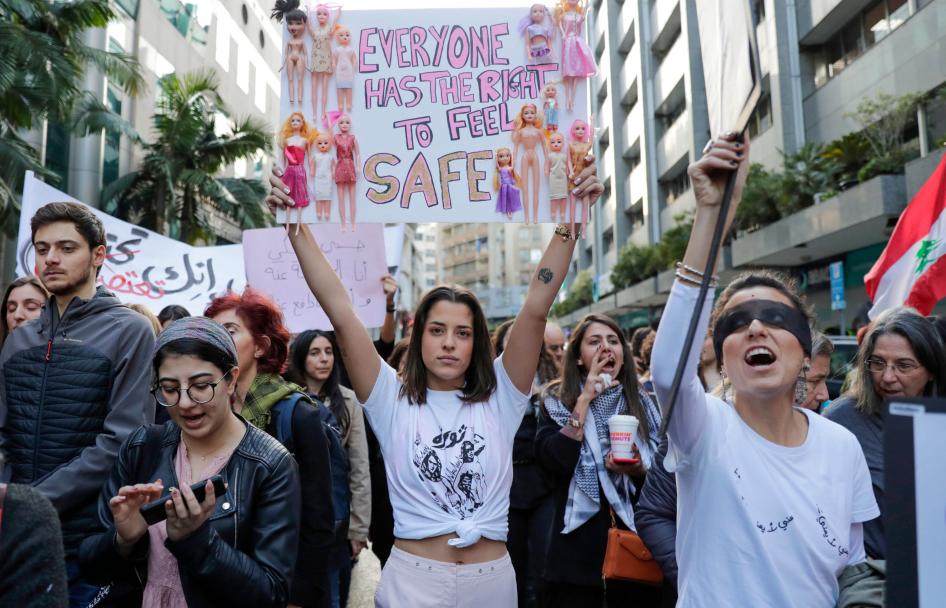(Beirut) – Lebanon’s new sexual harassment law falls short of international standards by addressing sexual harassment solely as a crime and neglecting prevention, labor law reforms, monitoring, and civil remedies, Human Rights Watch said today in advance of International Women’s Day on March 8, 2021. The Lebanese government should adopt a comprehensive approach, including by ratifying and implementing the International Labour Organization (ILO) Violence and Harassment Convention.
On December 21, 2020, Lebanon passed the “Law to Criminalize Sexual Harassment and [for] Rehabilitation of Its Victims.” The law is an advance by making sexual harassment a crime and outlining whistleblower protections. However, it falls short of the Violence and Harassment Convention, which says that governments should address violence and harassment at work through an “inclusive, integrated and gender-responsive approach,” including through labor laws, occupational safety and health laws, and equality and nondiscrimination laws, in addition to criminal law.
“Making sexual harassment a crime is an important step to condemn abusive behavior that has long been tolerated and normalized in Lebanon, but it’s not enough,” said Nisha Varia, women’s rights advocacy director at Human Rights Watch. “Public information campaigns, mandatory requirements for employers to prevent and respond to sexual harassment, monitoring, and enforcement are all essential for tackling this serious issue that affects women’s personal and professional lives.”
Sexual harassment is a widespread problem in Lebanon. A 2016 report by the International Men and Gender Equality Survey in Lebanon and UN Women found that two-thirds of women respondents reported experiencing sexual harassment in public spaces, with many experiencing it in the three months preceding the survey.
The law defines sexual harassment as “any bad and repetitive behavior that is extraordinary, unwelcome by the victim, and with sexual connotation that constitutes a violation of the body, privacy, or emotions.” The law notes that sexual harassment can occur through speech, actions, and electronic means. The law also considers single or repeated acts that use, “psychological, moral, financial, or racist pressure to obtain benefits of sexual nature” as sexual harassment.
The law punishes sexual harassment with up to 1 year in prison and fines of up to 10 times the minimum wage. In certain contexts, including in the context of subordination or a work relationship, it is considered a serious crime, and prison time and fines can be increased to up to 4 years and 50 times the minimum wage.
A positive aspect of the law is protection of victims from retaliation, including in pay, promotion, transfer, contract renewal, or disciplinary measures. The law contains whistleblower protections and prohibits discrimination, abuse, or disciplinary measures against people who report harassment or testify about the abuse. Such retaliation can be punished by up to 6 months in prison and a fine of 20 times the minimum wage.
However, several women’s rights groups, many of which worked for a decade on another, more comprehensive version of the bill that was submitted by the National Commission on Lebanese Women, expressed disappointment in the limited scope of the approved law, as well as civil society groups’ exclusion from the final discussions and review of the law before it was finalized. Inaya Ezzeddine, chair of the women and children committee in the parliament, submitted the version of the law that was ultimately adopted.
Karim Nammour, a lawyer from the rights watchdog Legal Agenda, raised several concerns that he said could diminish the law’s effectiveness for protecting harassment victims, especially in the workplace. “It will also be important to outline realistic protections for complainants,” he told Human Rights Watch. “How will you keep going to your work if you filed a criminal complaint against your employer? Courts take three to four years. You may get compensation after, but you will probably have lost your job.”
Survivors of sexual harassment and violence often risk re-traumatization and stigmatization when seeking remedies through the criminal law system due to discriminatory attitudes at police stations, and from prosecutors and judges; the high burden of proof on the survivors, and the public nature of criminal hearings. The International Commission of Jurists found that many obstacles in the administration of the Lebanese criminal system impede women’s access to justice for sexual and gender-based violence. They include a lack of effective gender-sensitive investigations, the lack of competence by people carrying them out, and of resources, and discriminatory policies, practices, and gender stereotypes by judicial officials.
Although article 3 of the new law notes that steps should be taken to protect the victim and witnesses during investigation and prosecution, the article remains vague. Gender-responsive training for security agencies, prosecutors, and judges is essential for treating victims sensitively and for providing a safe environment for reporting and pursuing complaints.
In an important step, Lebanon’s law establishes that criminal prosecution does not prevent the pursuit of civil remedies including for unlawful termination of employment and that victims have the right to compensation for psychological, moral, or financial damage. However, the law does not set out the legal framework through which survivors can seek a remedy through the civil courts.
Lebanon should provide a clear path for civil remedies for women who may not want to access the criminal justice system or wish to do so alongside criminal complaints, Human Rights Watch said.
The ILO Violence and Harassment Convention sets out minimum obligations for governments on preventing and responding to violence and harassment at work. It emphasizes prevention measures, including through mandatory workplace policies and training programs. A 2018 study by the Arab Foundation for Freedoms and Equality found that only 15 percent of employers surveyed in Lebanon have policies that protect against sexual harassment in the workplace, and the new law will not remedy that.
The ILO Convention also addresses prevention by requiring governments to identify high-risk sectors and marginalized populations particularly vulnerable to abuse. For example, in Lebanon, this could include migrant domestic workers, isolated in private homes and tied to their employers through the kafala (sponsorship) system, Syrian and Palestinian refugee women, who either lack legal residency or who do not have the required work permits, and transgender women whose access to employment is already limited. Deep power imbalances contribute to harassment, discriminatory attitudes, and isolation and precarious legal status place additional barriers to reporting abuse.
Lebanon should also conduct public awareness campaigns. The ILO treaty’s standards and the demands of the global #MeToo movement have emphasized the importance of such campaigns to shift social norms, raise information about these rights, and encourage survivors to come forward.
Article 6 of the law requires the Social Affairs Ministry to establish a fund to support sexual harassment survivors, prevent harassment and rehabilitate abusers, through annual budgetary allocations, donations, and 10 percent of the fines assessed against those convicted under the law. However, Nammour noted that previous funds established along these lines, including ones to protect victims of family violence or human trafficking, have not been activated or took years to put into operation due to delays in passing the necessary legislative or regulatory decrees.
“Women in Lebanon deserve to work in safety and dignity, free of sexual harassment and violence,” Varia said. “The government should issue decrees to elaborate civil remedies, and set out a national strategy, with input from civil society, on public campaigns to break taboos and workplace policies to address the full range of sexual harassment that takes place, not just the worst cases.”








